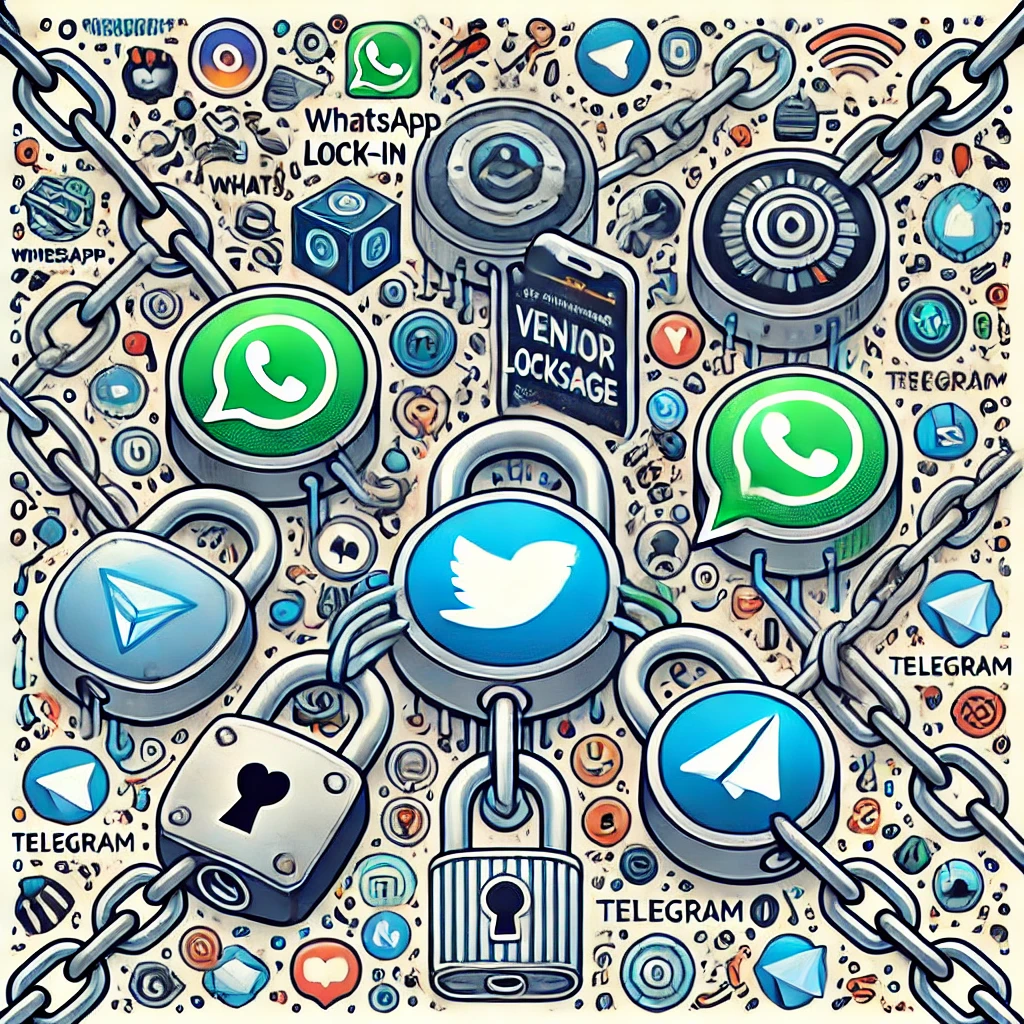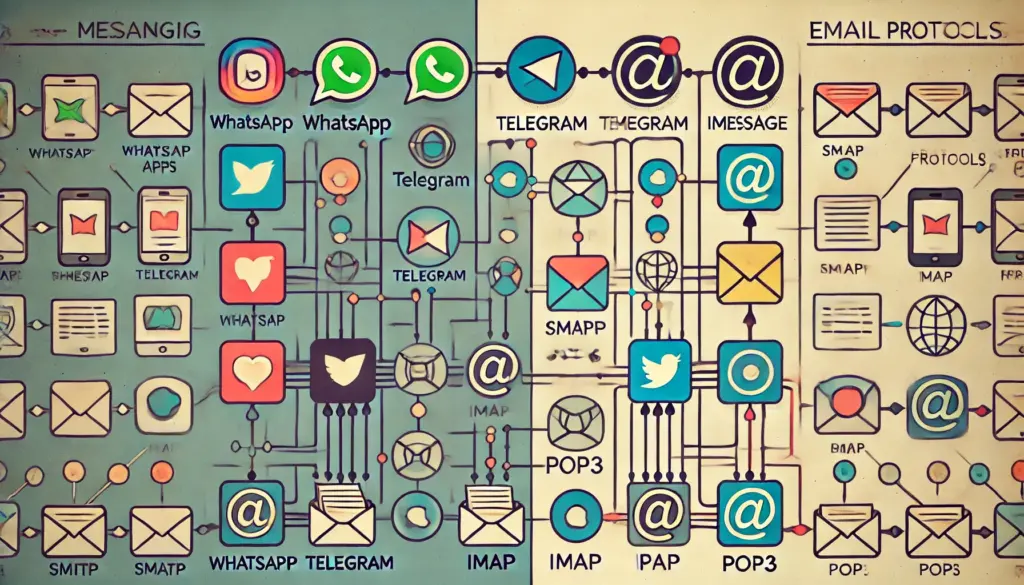In the digital age, messaging apps have become an integral part of our daily communication. With a plethora of messaging platforms available, there is still no universal standard for messaging, unlike email protocols. In this post, we will delve into the history, present, and future of messaging, comparing popular apps like WhatsApp with the emerging RCS (Rich Communication Services) protocol. We’ll explore the benefits, challenges, and potential of these platforms, aiming to provide a comprehensive understanding of the future of messaging.
No Standardization of Protocol in Messaging
The lack of standardization in messaging protocols has led to fragmented communication. Email protocols like SMTP, IMAP, and POP3 provide a universal standard, allowing seamless communication across different email clients. However, messaging apps like WhatsApp, Telegram, and others use proprietary protocols, limiting interoperability. This fragmentation means users are often confined to specific platforms, unable to communicate seamlessly across different apps.
Problems Solved by WhatsApp, Telegram, etc.
Modern messaging apps like WhatsApp and Telegram have addressed several issues that older methods like SMS and early instant messaging apps (e.g., Gtalk) could not:
- End-to-End Encryption: Ensures that only the communicating users can read the messages, enhancing privacy and security.
- Multimedia Sharing: Allows the sharing of images, videos, voice messages, and other media types.
- Group Chats: Facilitates communication among multiple users simultaneously.
- Cross-Platform Sync: Lets users access messages on different devices, ensuring a seamless experience.
These features have significantly improved user experience, making these apps immensely popular.
Dominance of Proprietary Software in Messaging
Proprietary messaging apps dominate the market due to their robust features and widespread adoption. Companies like Facebook (owner of WhatsApp and Messenger) and Telegram have massive user bases, creating network effects that make it difficult for new entrants to gain traction. This dominance, however, comes with drawbacks such as vendor lock-in and privacy concerns. Users are often at the mercy of the companies’ policies and changes, which can affect their privacy and data security.

Challenges and Problems in Proprietary Software
Proprietary messaging apps face several challenges:
- Privacy Issues: Concerns about data collection and potential misuse of user information.
- Interoperability: Users cannot communicate across different apps, leading to a fragmented user experience.
- Dependence on Companies: Users are subject to the policies and changes made by the owning companies, which can impact their user experience and data privacy.
Need for More Adoption of Open Protocols in Messaging
Adopting open protocols can mitigate many issues associated with proprietary systems. Open protocols promote interoperability, allowing users on different platforms to communicate seamlessly. They also enhance privacy and security, as open standards are typically subject to rigorous public scrutiny and improvement. Examples of successful open protocols in other domains include email and web standards, which have facilitated seamless and secure communication and information exchange.

How RCS Will Solve Challenges and Potentially Surpass Proprietary Software
RCS (Rich Communication Services) is designed to address the limitations of proprietary messaging apps. Key features of RCS include:
- Advanced Messaging Features: Group chat, high-resolution photo sharing, read receipts, and more.
- Carrier Integration: RCS works over carrier networks, providing a universal standard for communication.
- Interoperability: RCS aims to unify messaging standards, enabling seamless communication across different devices and networks.
These features position RCS as a potential game-changer in the messaging landscape, offering a universal platform for communication.
Will RCS Support Third-Party Clients?
The potential for RCS to support third-party clients is significant. If RCS can provide open APIs and encourage third-party development, it could foster innovation and broader adoption. This approach would ensure users have various client options while maintaining a unified communication standard, similar to how email protocols work. This would also promote competition and innovation in the messaging space, benefiting users with better features and services.
RCS vs SMTP: Revolutionizing Messaging Like SMTP Did for Email
SMTP (Simple Mail Transfer Protocol) revolutionized email by providing a standard protocol for sending emails across different networks and devices. Similarly, RCS has the potential to revolutionize messaging by offering a universal standard that enables rich communication features across different networks and devices. Just as SMTP facilitated reliable and efficient email communication, RCS aims to provide a seamless and feature-rich messaging experience for users worldwide.

Why RCS is Still Not Mainstream and Not Adopted Universally
Despite its potential, RCS faces several challenges in achieving mainstream adoption:
- Carrier Support: RCS requires the support of mobile carriers, and not all carriers have fully implemented it.
- Device Compatibility: Older devices may not support RCS, limiting its adoption.
- Competition with Established Apps: Popular messaging apps like WhatsApp and Telegram already have a large user base, making it difficult for RCS to gain traction.
- Fragmentation: Different implementations of RCS by various carriers can lead to inconsistent user experiences.
Future of Messaging
The future of messaging likely lies in a blend of robust proprietary platforms and open protocols like RCS. As users demand more privacy, security, and interoperability, the industry must evolve. The adoption of open standards like RCS, combined with the innovative features of proprietary apps, can provide a balanced and user-friendly messaging ecosystem. The future of messaging depends on finding the right balance between proprietary innovation and open standardization.
Conclusion
Messaging apps have transformed communication, but the lack of standardization remains a challenge. Proprietary apps like WhatsApp and Telegram have addressed many issues but come with their own set of problems. The adoption of open protocols like RCS promises a future where messaging is more unified, secure, and user-friendly. The future of messaging hinges on finding the right balance between proprietary innovation and open standardization.

Amit Mittal is a seasoned tech entrepreneur and software developer specializing in SaaS, web hosting, and cloud solutions. As the founder of Bitss Techniques, he brings over 15 years of experience in delivering robust digital solutions, including CMS development, custom plugins, and enterprise-grade services for the education and e-commerce sectors.
